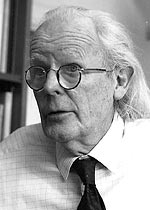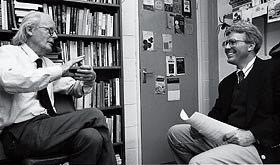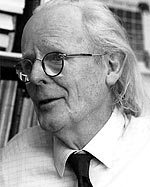Interview: John Maynard Smith

My recent trip to southern England was a Darwinian adventure. The itinerary included a pilgrimage to the town of Downe to tour Darwin's home (now a museum) and a visit to the University of Sussex to meet John Maynard Smith, one of the most important evolutionary biologists since Darwin. In fact, the Royal Society of London awarded the Darwin Medal to Dr. Maynard Smith for his research on the evolution of sex. Professor Maynard Smith has also pioneered the application of game theory to evolutionary biology. One of this book's themes is the interdisciplinary character of biology, and John Maynard Smith's career is a grand example. He arrived at biology as an engineer and mathematician, and his research extends biology to the social sciences and humanities.
How and why did you make the transition from aircraft engineer to evolutionary biologist?
I didn't realize when I was at school that being a biologist was something you could do. I didn't learn any science at school at all, formally. I went to read engineering at university and then the Second World War came along. So I finished my engineering degree, and was told to design airplanes. Mind you, I quite enjoyed that. It really wasn't until after the war that I decided I didn't want to spend the rest of my life designing airplanes, and by that time, of course, I was grown up. I had always been interested in biology, so I went back and took a second degree in biology.
You say you were always interested in biology. Tell us about that.
I lived in London until I was eight years old. There is not a lot of natural history you can do in London, but I remember going to the Natural History Museum and the zoo. When I was eight my father died, and I went to live in the country. I started bird watching, beetle collecting—you know, those things that kids do. I have been obsessed by natural history ever since. The real trick was to be able to fit together the two things that I like doing—natural history and mathematics. Fitting them together has been very, very fortunate.
And how did you fit them together? How does your background in math and engineering affect your approach to biology?
I planned my education quite deliberately, with my eyes open. I was twenty-eight when I went back to school after the war. I chose University College, London because I knew that J. B. S. Haldane was there. He was one of the great figures in the application of mathematics to biology, and he was one of the people who really transformed the way we see evolution by showing that you can make a marriage of evolution and genetics. He did so effectively by using very simple-minded mathematics. I sort of learned by copying him, I suppose.
What do you think are the most interesting questions in evolutionary biology today?
At the moment I don't think we are looking for a completely new way of understanding evolution. I think the basic theory is fine, but there are lots of particular problems. The two that I am really interested in are at opposite ends of evolution, oddly enough. One is the origin and evolution of human language, and the other is the evolution of bacteria. Bacterial evolution is practically important right now, and it is also nice to study because bacteria have a short generation time—they get on with it. You don't have to wait for millions of years for something to happen.
One of the problems you work on in bacterial evolution is drug resistance. What are some of the medical implications of this work?
The medical implications are very serious and in some ways tragic. More and more bacteria are becoming resistant to the antibiotics we use to control them. I believe that in the United States, you now have a problem with tuberculosis being drug-resistant. A number of other diseases which until recently were thought very readily controlled by antibiotics are ceasing to be so. This is because the bacteria have evolved a resistance to the drugs that physicians are using, and we can't go on indefinitely finding new drugs that bacteria aren't resistant to. It is a very serious practical problem.
 Can you tell us a little bit more about your interest in the origin of language?
Can you tell us a little bit more about your interest in the origin of language?
It arose because a young Hungarian colleague and I are trying to write a book about what we call "the major transitions." These include all the very big changes, like the origin of life itself, the origin of cells, the origin of chromosomes, the origin of multicellular organisms. The last big transition is the origin of humans. The one thing that really separates us from other animals is our ability to talk. There is no other fundamental difference between us and chimpanzees.
It is a very odd fact that until relatively recently, although humans had become erect and physically like us, and their brains had gotten bigger, and so on, they were incredibly conservative in the tools they used. The same kind of hand ax was made for a quarter of a million years. It is an unbelievable fact, but it's true. Then suddenly, about 50,000 years ago, people became very inventive. They refined fish hooks, needles, painting on the walls, burial of the dead, figurines, and spears. All sorts of new things suddenly started happening. What on Earth happened 50,000 years ago to make this possible? I think most of the people who have thought about this seriously have come to the conclusion that the only answer that makes sense is language—it helps you to think. Just try thinking without words.
Another issue you have thought a lot about is the origin and maintenance of sex. Why is sex such an interesting problem in evolutionary biology?
I think my contribution to the study of the evolution of sex has largely been to ask questions about the points I feel are puzzling rather than to find answers. One can see what's puzzling if one asks, "What is essential about sex?" One talks about sex for reproduction, but in fact sex and reproduction are the precise opposites of one another. Reproduction is a process by which one cell turns into two, and sex is the process whereby two cells turn into one. Now if you are a Darwinist and think that those organisms that multiply most successfully will in some sense outcompete the ones that don't multiply successfully, what on Earth is the point in stopping multiplying and actually reducing the number of individuals by two individuals fusing? It is a very puzzling phenomenon when one looks at it that way. Except for a few parthenogenetic organisms, sex is universal in the sense that all existing eukaryotes are either themselves sexual or descended from something sexual and became asexual later in their evolution. In other words, sexual reproduction seems to be the primitive condition for all eukaryotes.
If not reproduction, then what does sex accomplish?
I take the simple-minded view, which is that the great advantage of sex is an advantage to a population rather than to an individual. The advantage is that the population can evolve more. If two favorable mutations occur in two different members of the population and they have sex, those two favorable mutations can come together in a single descendant. If they don't have sex, the mutations can't come together. And when you do calculations, it turns out that sex can have a very considerable effect in accelerating the rate at which populations evolve in response to changing circumstances. I think the data support this view in that very few species of eukaryotes have been asexual for a very long time, in evolutionary terms. Some species may have been asexual for perhaps thousands or maybe even tens of thousands of years, but there probably aren't very many organisms that have been asexual for longer than that. Asexuality seems to work fine for a time and then the world changes, they can't change, and the population goes extinct. I think that is what maintains sex—that's why asexual populations are rare and relatively young. I don't think the maintenance of sex is as difficult a problem as its origin. I suspect that sex originated just once.
Can you speculate on how sex began?
The most plausible guess that I can make about the origin of sex goes something like this. The first stage was a population of organisms somewhere that had a haploid/diploid life cycle. Perhaps part of the year they were diploid (with two sets of chromosomes), and then they became haploid (having a single set of chromosomes). There are circumstances in which it is beneficial for an organism to be diploid—notably, if there is a lot of ionizing radiation about. If there are two copies of the chromosome set, an organism can repair DNA damage by comparing one set with the other. Haploid organisms are at a disadvantage because they have only one copy, and if it is damaged, they haven't got another copy to use to tell them how to repair it. However, haploids do have advantages; for example, they can grow faster.
I imagine an organism that had a haploid/diploid life cycle but no sex. When it had to go from being diploid to haploid, it would just undergo what we now call meiosis, which halves the number of chromosomes. When it had to become diploid again, it would just double its chromosomes without the cell dividing. I can then see it evolving into a sexual organism by replacing the process whereby it doubled its chromosomes and became diploid with the fusion of two haploid cells. The advantage is that if two different haploid cells have different mutation damage, when they fuse, they cover up each other's weaknesses. It's what I call the engine and gearbox theory of sex—you combine two clapped-out motor cars and make one functional motor car out of them by taking the engine out of one and the gearbox out of the other. But it's all terribly speculative.
Why are there only two sexes in most species? Why not three or four or ten different sexes?
I think to answer that, one has to ask, "How would you have three sexes?" There are two possible things that might happen. One would be that the new individual is formed from the genetic material from only two of the sexes, and the third sex is some kind of nurse. That's what happens in an ant's nest. The other alternative would be that every new individual has to start from the fusion of genetic material from three kinds of parents: a male, a female, and a zombie if you like. Sex is hard enough. In order to get sex to work, an individual has to produce a gamete with exactly half the chromosome number. Imagine having three sets of chromosomes and producing a gamete with only one of them! Imagine evolving that! There is nothing to be gained by having three sexes that I can see, and it would be incredibly difficult to evolve the cell division that gave you one-third of the genes, and exactly the right third.
 Why, in most species, is the male-to-female ratio close to one-to-one?
Why, in most species, is the male-to-female ratio close to one-to-one?
This is an interesting question. Clearly if you wanted to arrange for the population to have as many offspring as possible, you would have ten, twenty times as many females as males. Each male could then easily fertilize maybe 20 females. But let's say, using humans as an example, that women were allowed to choose the sex of each child with the requirement that they would choose so as to maximize the number of their own grandchildren. What would happen? Clearly, if the other women were mostly choosing to have daughters you should have sons because individuals of whichever is the rarer sex will have more children. If everybody else is choosing to have sons, you would choose daughters. Supposing there are 100 females and only 50 males. On average, each male gets to mate with two females, and he could have twice as many children as each female. The only stable state is when there is an equal number of both boys and girls.
You've also worked on the problem of sexual selection. Tell us about that research.
The idea of sexual selection goes back to Darwin, who said that it would really take two forms. One form would be the members of a single sex, usually males, competing with one another for access to the members of the other sex. Clearly this happens. The form that has puzzled people a lot more is the idea of female choice, which is that females choose to mate with one male instead of another. That has puzzled people because they couldn't understand how a female could choose and what would be in it for her if she did.
Oddly enough, one of the experiments I did in the 1950s answered both these questions for Drosophila melanogaster, the common fruit fly in Britain. The females I found mate with healthy males and do not mate with inbred males or old males, sick males or males that can't see very well. It really pays them to do this because they have better offspring if they're choosy. How do they do it? They do it by dancing. What happens is the male sees the female and he comes and faces her. When he is facing her, the female darts quickly to one side and the male has to dart sideways and keep on facing her. There is a very quick dance with the female going from side to side and the male following her. If he succeeds in facing her for a few passages, she stands still, and mating takes place. If he is inbred or aged he falls behind, he can't keep up, and the female just flies away. So the female is selecting which male she mates with, she is doing it by dancing, and it pays off in healthier offspring.
The theory of punctuated equilibrium has captured much attention among evolutionary biologists. What is punctuated equilibrium, and does it pose a problem for the basic Darwinian view of life?
This is a difficult question to answer because I don't think the proponents of punctuated equilibrium are particularly lucid in telling us just what they think. The factual argument, which most of us probably would now accept. is that if you look at fossil records, you do not see continuous gradual change. Instead you see what they call stasis, which is populations changing very little indeed for long periods of time and then changing in really rather sudden transitions. But understand when we talk about a sudden transition, we are not talking about 10 years or 1000 years. Something that takes 100,000 years is sudden in geological terms. On this scale of time, there is nothing wildly new about the idea of relatively rapid origin of species—you find a lot of this idea in George Gaylord Simpson's work in the 1940s and 1950s. It certainly does not, as I see it, challenge Darwinism. I am not saying it is uninteresting, but it just doesn't make a big difference in the way we see evolution. What would make a big difference would be if when those transitions took place, they took place by processes other than by natural selection operating on random variation within populations. It has never been clear to me whether the proponents of punctuated equilibrium actually believe there is some profoundly different process that happens during those punctuational events. Until they answer that question, I have no doubt that, basically, Darwin got it right.
We speak of natural selection and many other wide-ranging sets of ideas in science as "theories." What does theory mean in science?
Well, the first thing to say is that all science consists of theory; it's not peculiar to evolutionary biology. The difference between a scientific theory and an idea like a political philosophy or a religious belief is that you can test scientific theories; they have consequences. You can say, "If my theory is correct, then so-and-so," and you can go out and see whether the so-and-so is the case. If it isn't, you've got to forget about your theory. There are plenty of false theories, as well as correct ones. The real point is that theories should be testable.
You wrote that Darwin made it possible for us to see nature simultaneously with the eyes of a child and a philosopher. Can you explain?
Darwin was a supreme naturalist, you understand. Darwin came to this business not originally out of any deep philosophical concerns but simply because he was fascinated by natural history. All through his life he did beautiful work in natural history—on earthworms, on orchids, on coral reefs—you name it, he thought about it. He had, I take it, a child's wonder at nature. To look at nature is astonishing, it really is. If you can look at birds or wildflowers and don't feel a sense of wonder, then something's a bit wrong. And yet you can also think about nature like a scientist, a philosopher, or, in my case, a mathematician: You can reason about nature, and you can deduce things about it. It is that combination I find in my life, and I think Darwin made that possible.
©2005 Pearson Education, Inc., publishing as Benjamin Cummings